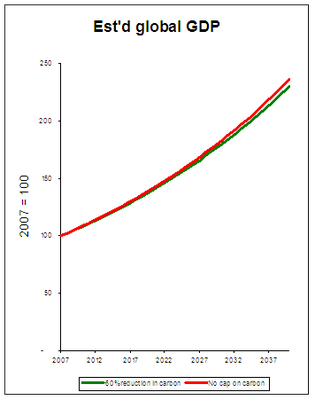Uh-oh, even the wild-eyed hippies at the International Monetary Fund are now admitting that reducing carbon emissions will cost the economy dearly. I made this chart to illustrate:

The red line is business as usual: we continue using the earth’s atmosphere as a free dumping ground for our pollution. The green line is what happens if we reduce our emissions 60% below 2002 levels. (Both lines are indexed to 2007 as a reference year, which I arbitrarily assigned a value of 100).
See what I mean? Huge difference. Huge.
</sarcasm>
It’s the difference between an annual average growth rate of 2.56% and 2.64%.
Wall Street Journal article is here.








Richard
Great graph. Of course the problem has never been the overall effect on global GDP. It has had to do with the real world profits of certain companies. When making a transition from one economy to another, there will always be ‘losers’. Unfortunately, at the moment, many of those are the ones with very strong political influence. It is as if the buggy whip manufacturers or the whale oil producers kept the world economies stuck in a pre-Industrial age world. Now, there are many things wrong with the Industrial Age but we did stop hunting whales for their fuel and the internal combustion engine did provide a large number of positive effects. We just now have to move beyond its negative effects.